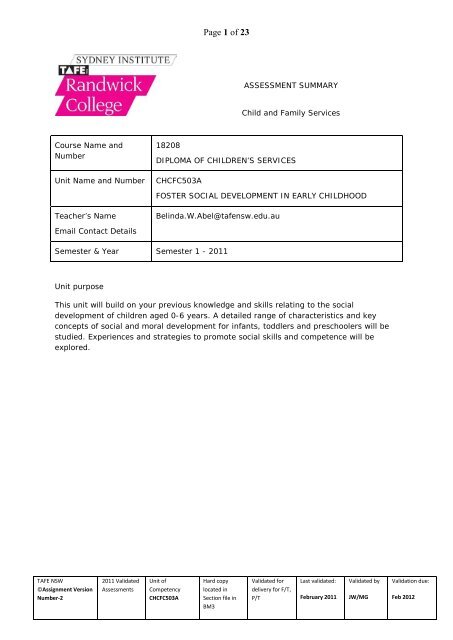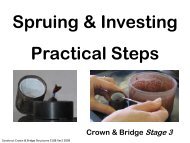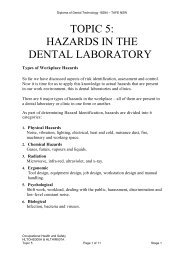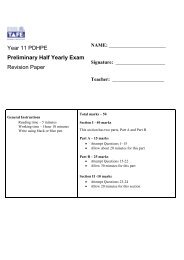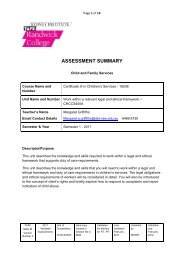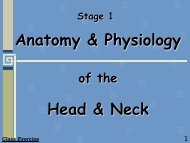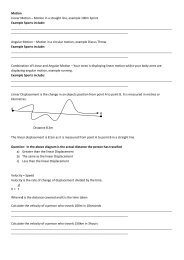CHCFC503A - Randwick College Wiki
CHCFC503A - Randwick College Wiki
CHCFC503A - Randwick College Wiki
You also want an ePaper? Increase the reach of your titles
YUMPU automatically turns print PDFs into web optimized ePapers that Google loves.
Page 1 of 23<br />
ASSESSMENT SUMMARY<br />
Child and Family Services<br />
Course Name and<br />
Number<br />
Unit Name and Number<br />
18208<br />
DIPLOMA OF CHILDREN’S SERVICES<br />
<strong>CHCFC503A</strong><br />
FOSTER SOCIAL DEVELOPMENT IN EARLY CHILDHOOD<br />
Teacher’s Name<br />
Belinda.W.Abel@tafensw.edu.au<br />
Email Contact Details<br />
Semester & Year Semester 1 - 2011<br />
Unit purpose<br />
This unit will build on your previous knowledge and skills relating to the social<br />
development of children aged 0-6 years. A detailed range of characteristics and key<br />
concepts of social and moral development for infants, toddlers and preschoolers will be<br />
studied. Experiences and strategies to promote social skills and competence will be<br />
explored.<br />
TAFE NSW<br />
©Assignment Version<br />
Number-2<br />
2011 Validated<br />
Assessments<br />
Unit of<br />
Competency<br />
<strong>CHCFC503A</strong><br />
Hard copy<br />
located in<br />
Section file in<br />
BM3<br />
Validated for<br />
delivery for F/T,<br />
P/T<br />
Last validated:<br />
February 2011<br />
Validated by<br />
JW/MG<br />
Validation due:<br />
Feb 2012
Page 2 of 23<br />
ELEMENT<br />
Elements define the essential<br />
outcomes of a unit of<br />
competency.<br />
1. Support children to<br />
build and maintain<br />
trusting relationships<br />
PERFORMANCE CRITERIA<br />
The Performance Criteria specify the level of<br />
performance required to demonstrate achievement of<br />
the Element. Terms in italics are elaborated in the<br />
Range Statement.<br />
• 1.1 Listen attentively and show children their<br />
views are valued and acknowledged<br />
• 1.2 Acknowledge and support children’s<br />
preferences for particular adults and peers<br />
• 1.3 Help children to understand and accept<br />
responsibility for their own actions<br />
• 1.4 Encourage children to express and mange<br />
feelings appropriately<br />
• 1.5 Support children’s various levels of interaction<br />
and participation with others during play<br />
2. Plan experiences for<br />
children to support and<br />
cooperate with others<br />
• 2.1 Encourage children to respect each other’s<br />
individual needs, abilities and interests<br />
• 2.2 Encourage children to regard differences<br />
positively and to discuss these differences<br />
• 2.3 Support children who have difficulty<br />
interacting with others, to establish and maintain<br />
friendships and group membership<br />
• 2.4 Acknowledge and encourage appropriate,<br />
supportive and effective communication between<br />
children<br />
• 2.5 Provide experiences and opportunities that<br />
promote children’s moral development and prosocial<br />
skills<br />
TAFE NSW<br />
©Assignment Version<br />
Number-2<br />
2011 Validated<br />
Assessments<br />
Unit of<br />
Competency<br />
<strong>CHCFC503A</strong><br />
Hard copy<br />
located in<br />
Section file in<br />
BM3<br />
Validated for<br />
delivery for F/T,<br />
P/T<br />
Last validated:<br />
February 2011<br />
Validated by<br />
JW/MG<br />
Validation due:<br />
Feb 2012
Page 3 of 23<br />
ELEMENT<br />
Elements define the essential<br />
outcomes of a unit of<br />
competency.<br />
3. Provide opportunities<br />
for social interaction<br />
PERFORMANCE CRITERIA<br />
The Performance Criteria specify the level of<br />
performance required to demonstrate achievement of<br />
the Element. Terms in italics are elaborated in the<br />
Range Statement.<br />
• 3.1 Plan and provide opportunities for different<br />
forms of social interaction between children with<br />
respect for each child’s needs, interests and<br />
development stage<br />
• 3.2 Encourage children to interact with a variety of<br />
people and to initiate and develop contact with<br />
others, as appropriate<br />
• 3.3 Arrange the environment to encourage<br />
interaction and also accommodate a child’s need<br />
for privacy, solitude and/or quiet<br />
• 3.4 Celebrate special occasions in culturally<br />
sensitive ways<br />
• 3.5 Respect children’s choice to watch and observe<br />
• 3.6 Structure experiences and equipment in ways<br />
that promote cooperation and conflict resolution<br />
• 3.7 Foster and respect children’s own grouping<br />
choice<br />
• 3.8 Talk about and respond to children as group<br />
members as well as individuals<br />
• 3.9 Identify and monitor children’s social skills and<br />
development<br />
• 3.10 Promote and support the use of social<br />
skills relevant to the transition to school for<br />
children of an appropriate age<br />
TAFE NSW<br />
©Assignment Version<br />
Number-2<br />
2011 Validated<br />
Assessments<br />
Unit of<br />
Competency<br />
<strong>CHCFC503A</strong><br />
Hard copy<br />
located in<br />
Section file in<br />
BM3<br />
Validated for<br />
delivery for F/T,<br />
P/T<br />
Last validated:<br />
February 2011<br />
Validated by<br />
JW/MG<br />
Validation due:<br />
Feb 2012
Page 4 of 23<br />
Required knowledge<br />
Fostering children’s social development – introductory knowledge<br />
• Recall definitions of social development & introduce theoretical<br />
perspectives e.g. Parten, Bronfenbrenner, Erikson, Social Learning<br />
Theory, Kohlberg, Bowlby, Ainsworth, Vygotsky<br />
• Influences on social development - social opportunities, culture, child<br />
rearing practices, disposition/temperament, gender/sex role, family<br />
circumstances, socio-economic, physical health, self concept/self<br />
esteem etc<br />
• Individual differences and strengths in the social domain<br />
• Interaction between the social domain and other domains of<br />
development<br />
• Recent influences on views of social development e.g. anti-bias<br />
curriculum, inclusive practices<br />
• Different perspectives on children’s social development in different<br />
cultures, communities, families etc<br />
• Applying relevant national child health and well being core<br />
competencies, accreditation principles, NSW Curriculum Framework<br />
and other relevant regulatory requirements<br />
• Explore ways to gather information about, document and monitor<br />
social and moral developmental progress<br />
Identifying social skills and characteristics - infancy through to preschool aged<br />
• Infants - attachment relationships in family & with caregivers, forming<br />
secondary attachments & hierarchies of attachments, attachment<br />
behaviours & responses, separation anxiety & stranger anxiety, focus<br />
on one-to-one relationships with caregivers, interactions and social<br />
responses to caregivers, social interests in other infants & children,<br />
play behaviours<br />
• Toddlers - continuing importance of attachment relationships,<br />
attachment behaviours & separation behaviours, egocentricity,<br />
negativism, difficulty sharing/turn taking & influence on social abilities,<br />
social interests in other toddlers, children & adults, interactions with<br />
children & adults, play behaviours,<br />
• Preschoolers - attachment relationships & changing separation<br />
behaviours, social interest in other children, interest in wider world,<br />
play behaviours, early helping, empathy & prosocial awareness,<br />
interactions with caregivers & peers, friendships & play mates,<br />
functioning in groups<br />
• Impact of social experiences & relationships on developing self<br />
awareness & self esteem<br />
• Stages in children’s moral development (Kohlberg)<br />
Providing experiences and opportunities to foster social development, cooperation<br />
and competence<br />
TAFE NSW<br />
©Assignment Version<br />
Number-2<br />
• Creating environments that allow for a range of play types, group<br />
sizes and solitude<br />
• Following children’s suggestions & interests in planning social<br />
experiences<br />
2011 Validated<br />
Assessments<br />
Unit of<br />
Competency<br />
<strong>CHCFC503A</strong><br />
Hard copy<br />
located in<br />
Section file in<br />
BM3<br />
Validated for<br />
delivery for F/T,<br />
P/T<br />
Last validated:<br />
February 2011<br />
Validated by<br />
JW/MG<br />
Validation due:<br />
Feb 2012
Page 5 of 23<br />
• Using anti-bias and inclusive approaches to enhance social<br />
relationships<br />
• Appropriate group sizes at different stages & for various purposes<br />
• Celebrating special occasions and cultural events with children, their<br />
families & communities<br />
• Designing experiences that promote moral development and prosocial<br />
skills<br />
• Structuring experiences to promote cooperation and conflict resolution<br />
• Arranging environments to accommodate various levels of interaction<br />
and participation e.g. watching, observing, privacy, solitude,<br />
withdrawal from the group etc<br />
• Promoting social skills relevant to school transition<br />
Interacting with the child to foster social development and trusting relationships<br />
• Monitoring the social skills and progress of individuals & groups<br />
• Supporting children’s social relationships and friendships with other<br />
children<br />
• Developing secondary attachments with caregivers & supporting<br />
primary attachments with family members (Attachment Curriculum)<br />
• Acknowledging, listening and valuing children’s views and preferences<br />
• Modelling and encouraging prosocial skills and the appropriate<br />
expression of feelings<br />
• Supporting children in negotiation, assertiveness, accepting<br />
responsibility and conflict resolution<br />
• Encouraging children to recognise & accept differences & show respect<br />
for others<br />
• Respecting each child’s level of participation and grouping choices<br />
• Assisting children to join play groups, developing group skills, raising<br />
children’s status in a group<br />
• Encouraging supportive and effective communication between children<br />
and with others<br />
Providing specialist assistance for children with social difficulties<br />
• Strategies for children with social difficulties and additional needs<br />
- Children who are new to the group<br />
- Unpopular, isolated & marginalised children<br />
- Children who have difficulty joining play groups<br />
- Bullying, name calling, excluding behaviour<br />
- Children who have difficulty accepting difference in others<br />
• Additional needs impacting on social functioning (e.g. autism,<br />
communication impairments)<br />
• Seeking support when children require specialist assistance with social<br />
difficulties<br />
Practical skills<br />
TAFE NSW<br />
©Assignment Version<br />
Number-2<br />
• Documents the social development and progress of both individual and<br />
groups of children<br />
• Demonstrates an understanding of the typical social skills and abilities<br />
of children across a range of ages<br />
• Designs experiences for individuals and groups that foster a range of<br />
2011 Validated<br />
Assessments<br />
Unit of<br />
Competency<br />
<strong>CHCFC503A</strong><br />
Hard copy<br />
located in<br />
Section file in<br />
BM3<br />
Validated for<br />
delivery for F/T,<br />
P/T<br />
Last validated:<br />
February 2011<br />
Validated by<br />
JW/MG<br />
Validation due:<br />
Feb 2012
Page 6 of 23<br />
social skills and promote moral development and prosocial skills<br />
• Demonstrates appropriate interaction strategies – self talk, parallel<br />
talk, descriptive praise<br />
• Provides relevant experiences and environments that foster social<br />
development for children from infancy to preschool aged.<br />
• Sets up a range of play & care environments for varying levels of<br />
participation and social play skills<br />
• Identifies environmental, situational and cultural aspects that impact<br />
on children’s social experience<br />
• Demonstrates time management, organisational skills and reflective<br />
practice when planning and providing developmental opportunities to<br />
enhance social skills<br />
• Uses a variety of strategies to encourage children’s social skills and<br />
key developmental tasks<br />
• Demonstrates interpersonal skills, empathy and active listening when<br />
interacting to support social skills and development<br />
• Practices anti-bias & inclusive principles<br />
• Supports children’s social relationships and friendships with other<br />
children<br />
• Supports primary and secondary attachments with family members<br />
and caregivers<br />
• Acknowledges, listens to and values children’s views and preferences<br />
• Models and encourages prosocial skills and the appropriate expression<br />
of feelings<br />
• Encourages children to recognise & accept differences & show respect<br />
for others<br />
• Arranges environments to promote interaction and accommodate<br />
privacy, solitude and quiet<br />
• Celebrates special occasions in culturally appropriate ways<br />
• Assists children to join play groups and develop group skills<br />
• Encourages supportive and effective communication between children<br />
and with others<br />
• Supports children in negotiation, assertiveness, accepting<br />
responsibility and conflict resolution<br />
• Respects each child’s level of participation and grouping choices<br />
• Promotes social skills relevant to school transitio<br />
Evidence requirements Learners must provide evidence of the ability to foster<br />
children’s social development by:<br />
• Demonstrating an understanding of the social development<br />
characteristics and differences of children aged 0-6 years.<br />
• Using strategies and interactions effectively to foster and extend the<br />
social development of children aged 0-6 years across.<br />
• Planning and implementing a range of meaningful learning<br />
opportunities and experiences to foster and extend the social<br />
development of individuals and groups of children aged 0-6 years.<br />
TAFE NSW<br />
©Assignment Version<br />
Number-2<br />
2011 Validated<br />
Assessments<br />
Unit of<br />
Competency<br />
<strong>CHCFC503A</strong><br />
Hard copy<br />
located in<br />
Section file in<br />
BM3<br />
Validated for<br />
delivery for F/T,<br />
P/T<br />
Last validated:<br />
February 2011<br />
Validated by<br />
JW/MG<br />
Validation due:<br />
Feb 2012
Page 7 of 23<br />
Grading criteria Results are reported as<br />
• Competent with Distinction<br />
• Competent with Credit<br />
• Competent<br />
• Not yet Competent<br />
Suggested grading criteria to be read in conjunction with Evidence Requirements<br />
above<br />
To be graded as competent the learner needs to:<br />
• Demonstrate the evidence requirements satisfactorily in a range of<br />
situations.<br />
• Use known information in relevant situations.<br />
To be graded competent with credit the learner needs to:<br />
• Demonstrate the evidence requirements independently in a wide range<br />
of situations.<br />
• Apply detailed information to new situations<br />
To be graded competent with distinction the learner needs to:<br />
• Demonstrate the evidence requirements consistently, independently<br />
and with creativity in an extensive range of situations<br />
• Independently research new information and adapt information to new<br />
situations<br />
TAFE NSW<br />
©Assignment Version<br />
Number-2<br />
2011 Validated<br />
Assessments<br />
Unit of<br />
Competency<br />
<strong>CHCFC503A</strong><br />
Hard copy<br />
located in<br />
Section file in<br />
BM3<br />
Validated for<br />
delivery for F/T,<br />
P/T<br />
Last validated:<br />
February 2011<br />
Validated by<br />
JW/MG<br />
Validation due:<br />
Feb 2012
Page 8 of 23<br />
Methods for collection of evidence<br />
The following table maps the recommended assessment tools to the Unit and<br />
Dimensions of Competency.<br />
Table of specifications for recommended assessment<br />
Assessment Task<br />
Elements, essential<br />
knowledge and<br />
skills critical<br />
aspects of<br />
assessment<br />
addressed<br />
Dimensions of<br />
competency<br />
(the 4 main aspects<br />
of work<br />
performance that<br />
need to be taken<br />
into account when<br />
assessing<br />
competency)<br />
Weighting<br />
Must pass all<br />
events<br />
Graded<br />
NC/AC/ACC/AC<br />
D<br />
Off the<br />
job<br />
On the<br />
job<br />
1. Monitoring and<br />
planning<br />
Document and<br />
monitor the social<br />
development of 2<br />
children – 0-5years.<br />
Based on these<br />
observations write a<br />
developmental<br />
summary /chart and<br />
provide a range of<br />
planning possibilities<br />
for each child.<br />
- Relates to<br />
elements 1-2<br />
-Relates to<br />
performance<br />
criteria-1.1-,1.9,<br />
2.2,2.4,2.6,2.8<br />
- Relates to critical<br />
aspects.<br />
- Relates to<br />
knowledge and<br />
skills<br />
□ Task skills<br />
ü Task<br />
management skills<br />
□ Contingency<br />
management skills<br />
□Job/role<br />
environment skills<br />
AC/NC<br />
AC/NC<br />
Child Play Session<br />
Task 1,2<br />
2 Work placement<br />
TAFE NSW<br />
©Assignment Version<br />
Number-2<br />
2011 Validated<br />
Assessments<br />
Unit of<br />
Competency<br />
<strong>CHCFC503A</strong><br />
Hard copy<br />
located in<br />
Section file in<br />
BM3<br />
Validated for<br />
delivery for F/T,<br />
P/T<br />
Last validated:<br />
February 2011<br />
Validated by<br />
JW/MG<br />
Validation due:<br />
Feb 2012
Page 9 of 23<br />
2. Learning<br />
opportunities &<br />
experiences<br />
Develop a range of<br />
experiences to foster<br />
the social<br />
development of<br />
children aged 0-6<br />
years.<br />
- Relates to<br />
elements 1-3<br />
_Relates to<br />
performance<br />
criteria-1.1-1-<br />
9,2.1-2.8,3.1-3-7<br />
- Relates to critical<br />
aspects.<br />
ü Task skills<br />
□ Task<br />
management skills<br />
ü Contingency<br />
management skills<br />
ü Job/role<br />
environment skills<br />
Some of these<br />
experiences must be<br />
implemented and<br />
evaluated with<br />
children aged 0-6<br />
years<br />
- Relates to<br />
knowledge and<br />
skills<br />
AC/NC<br />
AC/NC<br />
Task 1 Provision<br />
Play Session<br />
1 Provision plan<br />
work placement<br />
3. On-the-Job<br />
Performance &<br />
journals.<br />
Overall assessment<br />
by qualified<br />
workplace assessor<br />
using standardised<br />
checklist.<br />
Assessment should<br />
be based on<br />
observed<br />
performance,<br />
associated<br />
documentation<br />
(including journals),<br />
industry supervisor<br />
feedback,questionin<br />
g<br />
- Relates to<br />
elements 1-3<br />
-Relates to all<br />
performance<br />
criteria in all three<br />
elements.<br />
- Relates to critical<br />
aspects.<br />
- Relates to<br />
knowledge and<br />
skills<br />
ü Task skills<br />
ü Task<br />
management skills<br />
ü Contingency<br />
management skills<br />
ü Job/role<br />
environment skills<br />
AC/NC<br />
Codes: NC-not yet competent, AC-achieved competency, ACC-achieved<br />
competency credit, ACD-achieved competency distinction<br />
TAFE NSW<br />
©Assignment Version<br />
Number-2<br />
2011 Validated<br />
Assessments<br />
Unit of<br />
Competency<br />
<strong>CHCFC503A</strong><br />
Hard copy<br />
located in<br />
Section file in<br />
BM3<br />
Validated for<br />
delivery for F/T,<br />
P/T<br />
Last validated:<br />
February 2011<br />
Validated by<br />
JW/MG<br />
Validation due:<br />
Feb 2012
Page 10 of 23<br />
Specific Instructions to Learners:<br />
• You must complete and pass each individual assessment task for this Unit<br />
to meet the assessment requirements of the Unit.<br />
• If assessments are not submitted or are incomplete you will fail to meet<br />
the assessment requirements for the Unit.<br />
• Extensions and resubmissions of work may be granted at the discretion of<br />
the teacher. Resubmissions cannot receive a mark higher than a pass.<br />
• Assessments must include a cover sheet.<br />
• When specified in the Assessment description, the information you present<br />
should be referenced and presented according to <strong>Randwick</strong> TAFE Child &<br />
Family Services student handbook guidelines.<br />
Unit Assessment (OFF the JOB)<br />
Unit Title: Foster Social Development in Early Childhood<br />
Unit Code: <strong>CHCFC503A</strong><br />
Task 1 and 2 : Document and Planning (Off the Job) (Relates to Elements 1-3,<br />
Performance Criteria 1.1-3.7, required skills and Knowledge1.1-1.14, Essential<br />
Knowledge 1.1 and 1.2)<br />
Due Date: Task 1 and Task 2 Week 9 (6 th April)<br />
Task 1: Gather information about one child in play session, aged 0-5years,<br />
focusing on social development and record 4 written observations.<br />
4 written observations<br />
• Record one observation in the play session daily journal. (A photograph,<br />
comment with reflective interpretation and follow-up needs to be<br />
included).Print an extra copy in hand in with assignment.<br />
• Record three observations covering social development<br />
(1 anecdote, I running record, 1 learning story)<br />
• All observation needs to have interpretations and follow-up plans that<br />
include a description of a play idea.<br />
You will firstly need to gain the written permission of the child’s parent/s to be<br />
involved in this project, on the understanding that the child’s observations and<br />
summary will be submitted to your teacher for study purposes. If the child is old<br />
enough, you should also explain the project to them and ask their verbal<br />
permission to observe and write about them. Write some notes about how you<br />
did this and how the child responded.<br />
2. Based on your observations plan one experience to foster social development<br />
of the child observed and implement it in play session. Your experience should<br />
foster a range of skills listed below:<br />
TAFE NSW<br />
©Assignment Version<br />
Number-2<br />
2011 Validated<br />
Assessments<br />
Unit of<br />
Competency<br />
<strong>CHCFC503A</strong><br />
Hard copy<br />
located in<br />
Section file in<br />
BM3<br />
Validated for<br />
delivery for F/T,<br />
P/T<br />
Last validated:<br />
February 2011<br />
Validated by<br />
JW/MG<br />
Validation due:<br />
Feb 2012
Page 11 of 23<br />
- social skills to develop independence and autonomy<br />
-emerging skills of an individual<br />
-demonstrate your ability to select appropriate equipment and space<br />
-focus on interacting appropriately with the child to foster development<br />
Write out the experience in full using the suggested experience plan document. In<br />
this plan make sure that you identify what items you will need, who you are<br />
aiming the experience at and why, and possible outcomes.<br />
3. Evaluate the experience covering the following:<br />
Possible outcomes<br />
Teaching strategies<br />
Task 2: Developmental summary (Off the job)<br />
Using observations and information gathered create a developmental summary<br />
on the Childs development.<br />
A Developmental Summary is a written overview of the progress, characteristics,<br />
interests and strengths of a child or children, presented under headings for each<br />
development area. Your summary must be based on observations, and<br />
information gathered about the child development. It should show links to The<br />
Early Years Learning Framework (EYLF)<br />
This Developmental Summary is presented as a tablet organised under all the<br />
developmental (or domain) heading and Interests heading.<br />
You will need to:<br />
• Identify key behaviours and skills which show the progress of the focus child<br />
in developmental areas, their abilities, their emerging abilities and interests<br />
in a table.<br />
Gross<br />
motor<br />
Fine Motor Emotional Social Cognitive<br />
Interests<br />
• Then write a 200 word summary of the child’s interest and development<br />
with reference to The Early Years Learning Framework (EYLF).Include an<br />
introduction covering background information on child, interests and a<br />
paragraph on developing social development,.<br />
TAFE NSW<br />
©Assignment Version<br />
Number-2<br />
2011 Validated<br />
Assessments<br />
Unit of<br />
Competency<br />
<strong>CHCFC503A</strong><br />
Hard copy<br />
located in<br />
Section file in<br />
BM3<br />
Validated for<br />
delivery for F/T,<br />
P/T<br />
Last validated:<br />
February 2011<br />
Validated by<br />
JW/MG<br />
Validation due:<br />
Feb 2012
Page 12 of 23<br />
Task 3: Play Session Performance<br />
Your overall performance in play session will be assessed by your class teacher<br />
and play session assessor. Your assessor will use the following performance<br />
checklist for recording judgements made about your performance on the job.<br />
When using the performance checklists the assessor must determine whether a<br />
characteristic is or is not present or whether something was or was not done to a<br />
competent level. The assessor may need to ask you questions during or after a<br />
task or work sequence in order to:<br />
• clarify aspects of your work performance<br />
• assess your ability to listen, interpret and communicate information and ideas<br />
• assess essential knowledge and skills.<br />
Specific Instructions to Learners:<br />
• You must complete and pass each individual assessment task for this Unit<br />
to meet the assessment requirements of the Unit and go to work<br />
placement.<br />
• If assessments are not submitted or are incomplete you will fail to meet<br />
the assessment requirements for the Unit.<br />
• Extensions and resubmissions of work may be granted at the discretion of<br />
the teacher. Resubmissions cannot receive a mark higher than a pass.<br />
• Assessments must include a cover sheet.<br />
• When specified in the Assessment description, the information you present<br />
should be referenced and presented according to <strong>Randwick</strong> TAFE Child &<br />
Family Services student handbook guidelines.<br />
TAFE NSW<br />
©Assignment Version<br />
Number-2<br />
2011 Validated<br />
Assessments<br />
Unit of<br />
Competency<br />
<strong>CHCFC503A</strong><br />
Hard copy<br />
located in<br />
Section file in<br />
BM3<br />
Validated for<br />
delivery for F/T,<br />
P/T<br />
Last validated:<br />
February 2011<br />
Validated by<br />
JW/MG<br />
Validation due:<br />
Feb 2012
Page 13 of 23<br />
Unit Code and Title:<br />
<strong>CHCFC503A</strong> Foster Social development in Early Childhood<br />
CHCFC504A Support Emotional and Psychological development in Early<br />
Childhood<br />
CHCFC502AFoster Physical development in Early Childhood<br />
Note: On-job tasks are co assessed in the above three units<br />
Assessment relates to Elements 1-3, Performance Criteria 1.1-3.10, Required<br />
Skills, Essential knowledge and Employability skills. <strong>CHCFC503A</strong> Foster Social<br />
development in Early Childhood<br />
Assessment relates to Elements 1-3, Performance Criteria 1.1-3.6, Required<br />
Skills, Essential knowledge and Employability skills. CHCFC504A Support<br />
Emotional and Psychological development in Early Childhood<br />
Assessment relates to Elements 1-3, Performance Criteria 1.1-3.7, Required<br />
Skills, Essential knowledge and Employability skills. CHCFC502AFoster Physical<br />
development in Early Childhood<br />
Task 1: Documentation & planning (On the job)<br />
Part-1 Daily Journal<br />
Daily Journal: While on Work placement, you are required to record total 14 daily<br />
journal entries covering all units.<br />
Ensure 7 of these journal entries are on your focus child.<br />
Each day write a daily journal about the focus child’s play in one/more learning<br />
areas. These journal entries should be the basis of planned provisions, learning<br />
centres, and investigations. Journal entries must include jottings, photos/work<br />
samples with narratives, spontaneous interactions with children, collaboration<br />
with families and staff. Reflect on these entries and identify the interest from the<br />
child’s play. Comment on this child’s development followed by suggestions on<br />
further planning ideas.<br />
Part-2: Observe and plan<br />
Choose one focus child and complete 7 journal entries followed by planning ideas.<br />
Implement one plan for Physical; one for social, emotional and psychological.<br />
Background Information: Make sure you have written permission of the child’s<br />
parent/carer to observe and record the child development and interests. Gather<br />
other relevant information about your focus children such as parent’s background<br />
information. Developmental comments: Drawing on your research of typical<br />
behaviours and development, reflect and interpret on your entries; identify<br />
TAFE NSW<br />
©Assignment Version<br />
Number-2<br />
2011 Validated<br />
Assessments<br />
Unit of<br />
Competency<br />
<strong>CHCFC503A</strong><br />
Hard copy<br />
located in<br />
Section file in<br />
BM3<br />
Validated for<br />
delivery for F/T,<br />
P/T<br />
Last validated:<br />
February 2011<br />
Validated by<br />
JW/MG<br />
Validation due:<br />
Feb 2012
Page 14 of 23<br />
significant behaviours focusing on physical, social, emotional and psychological<br />
domains and link to The Early Year Learning Framework.<br />
Suggest at least one (1) planning idea and care giving strategy after each<br />
observation.<br />
Provision Plans Based on your observations of your focus child ensure there is one<br />
plan on physical development and one plan on social, emotional and psychological<br />
development. This is a total of two provision plans.<br />
Write out the experiences in full using the suggested provision plan document,<br />
implement it and write up reflection on the plan.<br />
Developmental Chart (summary)<br />
Using the observations and information gathered about your focus child create a<br />
developmental chart for your focus child.<br />
A developmental chart is a written overview of progress of your developmental<br />
abilities, presented under heading of each developmental domain. (Physical-<br />
Fine/Gross motor, Communication, Social, Emotional, Thinking child).<br />
Task 2: On the job performance (On the job)<br />
Your overall performance in the workplace will be assessed by a TAFE teacher or<br />
qualified assessor. Your assessor will use the following performance checklist for<br />
recording judgements made about your performance on the job. When using the<br />
performance checklists the assessor must determine whether a characteristic is or<br />
is not present or whether something was or was not done to a competent level.<br />
The assessor may need to ask you questions during or after a task or work<br />
sequence in order to:<br />
• clarify aspects of your work performance<br />
• assess your ability to listen, interpret and communicate information and ideas<br />
• assess essential knowledge and skills.<br />
The assessor will also:<br />
• read through any written tasks especially your journals to further assess your<br />
competence.<br />
• talk to staff members who are supervising or working with you in order to get<br />
feedback about your performance on a day-to-day basis.<br />
All aspects of your workplace performance including written tasks will be used to<br />
determine your final performance grade.<br />
TAFE NSW<br />
©Assignment Version<br />
Number-2<br />
2011 Validated<br />
Assessments<br />
Unit of<br />
Competency<br />
<strong>CHCFC503A</strong><br />
Hard copy<br />
located in<br />
Section file in<br />
BM3<br />
Validated for<br />
delivery for F/T,<br />
P/T<br />
Last validated:<br />
February 2011<br />
Validated by<br />
JW/MG<br />
Validation due:<br />
Feb 2012
Page 15 of 23<br />
On The Job<br />
Unit Code and Title:<br />
<strong>CHCFC503A</strong> Foster Social development in Early Childhood<br />
CHCFC504A Support Emotional and Psychological development in Early<br />
CHCFC502A Foster Physical development in Early Childhood<br />
Note: On-job tasks are co assessed in the above three units<br />
Assessment relates to Elements 1-3, Performance Criteria 1.1-3.7, Required<br />
Skills, Essential knowledge and Employability skills. CHCFC502AFoster Physical<br />
development in Early Childhood<br />
Assessment relates to Elements 1-3, Performance Criteria 1.1-3.10, Required<br />
Skills, Essential knowledge and Employability skills. <strong>CHCFC503A</strong> Foster Social<br />
development in Early Childhood<br />
Assessment relates to Elements 1-3, Performance Criteria 1.1-3.6, Required<br />
Skills, Essential knowledge and Employability skills. CHCFC504A Support<br />
Emotional and Psychological development in Early<br />
Task 1: Documentation & planning (On the job)<br />
Part-1 Daily Journal<br />
Daily Journal: While on Work placement, you are required to record total 14 daily<br />
journal entries covering all units.<br />
Ensure 7 of these journal entries are on your focus child.<br />
Each day write a daily journal about the focus child’s play in one/more learning<br />
areas. These journal entries should be the basis of planned provisions, learning<br />
centres, and investigations. Journal entries must include jottings, photos/work<br />
samples with narratives, spontaneous interactions with children, collaboration<br />
with families and staff. Reflect on these entries and identify the interest from the<br />
child’s play. Comment on this child’s development followed by suggestions on<br />
further planning ideas.<br />
Part-2: Observe and plan<br />
Choose one focus child and complete 7 journal entries followed by planning ideas.<br />
Implement one plan for Physical; one for social, emotional and psychological.<br />
Background Information: Make sure you have written permission of the child’s<br />
parent/carer to observe and record the child development and interests. Gather<br />
other relevant information about your focus children such as parent’s background<br />
information. Developmental comments: Drawing on your research of typical<br />
behaviours and development, reflect and interpret on your entries; identify<br />
significant behaviours focusing on physical, social, emotional and psychological<br />
TAFE NSW<br />
©Assignment Version<br />
Number-2<br />
2011 Validated<br />
Assessments<br />
Unit of<br />
Competency<br />
<strong>CHCFC503A</strong><br />
Hard copy<br />
located in<br />
Section file in<br />
BM3<br />
Validated for<br />
delivery for F/T,<br />
P/T<br />
Last validated:<br />
February 2011<br />
Validated by<br />
JW/MG<br />
Validation due:<br />
Feb 2012
Page 16 of 23<br />
domains and link to The Early Year Learning Framework.<br />
Suggest at least one (1) planning idea and care giving strategy after each<br />
observation.<br />
Provision Plans Based on your observations of your focus child ensure there is one<br />
plan on physical development and one plan on social, emotional and psychological<br />
development. This is a total of two provision plans.<br />
Write out the experiences in full using the suggested provision plan document,<br />
implement it and write up reflection on the plan.<br />
Developmental Chart (summary)<br />
Using the observations and information gathered about your focus child create a<br />
developmental chart for your focus child.<br />
A developmental chart is a written overview of progress of your developmental<br />
abilities, presented under heading of each developmental domain. (Physical-<br />
Fine/Gross motor, Communication, Social, Emotional, Thinking child).<br />
Task 2: On the job performance (On the job)<br />
Your overall performance in the workplace will be assessed by a TAFE teacher or<br />
qualified assessor. Your assessor will use the following performance checklist for<br />
recording judgements made about your performance on the job. When using the<br />
performance checklists the assessor must determine whether a characteristic is or<br />
is not present or whether something was or was not done to a competent level.<br />
The assessor may need to ask you questions during or after a task or work<br />
sequence in order to:<br />
• clarify aspects of your work performance<br />
• assess your ability to listen, interpret and communicate information and ideas<br />
• assess essential knowledge and skills.<br />
The assessor will also:<br />
• read through any written tasks especially your journals to further assess your<br />
competence.<br />
• talk to staff members who are supervising or working with you in order to get<br />
feedback about your performance on a day-to-day basis.<br />
All aspects of your workplace performance including written tasks will be used to<br />
determine your final performance grade.<br />
TAFE NSW<br />
©Assignment Version<br />
Number-2<br />
2011 Validated<br />
Assessments<br />
Unit of<br />
Competency<br />
<strong>CHCFC503A</strong><br />
Hard copy<br />
located in<br />
Section file in<br />
BM3<br />
Validated for<br />
delivery for F/T,<br />
P/T<br />
Last validated:<br />
February 2011<br />
Validated by<br />
JW/MG<br />
Validation due:<br />
Feb 2012
Page 17 of 23<br />
Practical Skills checklist<br />
Unit code and name: <strong>CHCFC503A</strong> Foster social development in early childhood<br />
Learner’s Name:<br />
Assessment<br />
Dates:<br />
Location:<br />
Key: Demonstration<br />
of Practical<br />
Skills (DP)<br />
Evidence of Associated<br />
Documentation (AD)<br />
Industry<br />
Supervisor<br />
Feedback<br />
(SF)<br />
Strategic<br />
Questioning Of<br />
the learner (SQ)<br />
Practical skills<br />
All elements<br />
• Demonstrates time management, organisational skills<br />
and reflective practice when planning and providing<br />
developmental opportunities to enhance social skills<br />
• Uses a variety of strategies to encourage children’s<br />
social skills and key developmental tasks<br />
• Demonstrates interpersonal skills , empathy and active<br />
listening when interacting to support social skills and<br />
development<br />
1. Support children to build and maintain trusting<br />
relationships<br />
• Acknowledges, listens to and values children’s views<br />
and preferences<br />
• Supports primary and secondary attachments with<br />
family members and caregivers<br />
• Supports children in accepting responsibility for their<br />
own actions<br />
• Models and encourages prosocial skills and the<br />
appropriate expression of feelings<br />
• Sets up a range of play & care environments for varying<br />
levels of participation and social play skills<br />
Evide<br />
nce<br />
D<br />
P<br />
A<br />
D<br />
S<br />
F<br />
S<br />
Q<br />
D<br />
P<br />
A<br />
D<br />
S<br />
F<br />
S<br />
Q<br />
Comments<br />
NC<br />
Pass<br />
Credit<br />
Distinction<br />
NC<br />
Pass<br />
Credit<br />
Distinction<br />
TAFE NSW<br />
©Assignment Version<br />
Number-2<br />
2011 Validated<br />
Assessments<br />
Unit of<br />
Competency<br />
<strong>CHCFC503A</strong><br />
Hard copy<br />
located in<br />
Section file in<br />
BM3<br />
Validated for<br />
delivery for F/T,<br />
P/T<br />
Last validated:<br />
February 2011<br />
Validated by<br />
JW/MG<br />
Validation due:<br />
Feb 2012
Page 18 of 23<br />
2. Plan experiences for children to support and cooperate<br />
with others<br />
• Encourages children to recognise & accept differences &<br />
show respect for others<br />
• Practices anti-bias & inclusive principles in interactions<br />
with children<br />
• Assists children to maintain friendships, join play groups<br />
and develop group skills<br />
• Encourages supportive and effective communication<br />
between children and with others<br />
• Designs & implements experiences for individuals and<br />
groups that foster a range of social skills and promote<br />
moral development<br />
3. Provide opportunities for social interaction<br />
• Documents the social development and progress of both<br />
individual and groups of children<br />
• Demonstrates an understanding of the typical social<br />
skills and abilities of children across a range of ages<br />
• Demonstrates appropriate interaction strategies – self<br />
talk, parallel talk, descriptive praise<br />
• Provides relevant experiences and environments that<br />
foster social development for children from infancy to<br />
preschool aged.<br />
• Identifies environmental, situational and cultural<br />
aspects that impact on children’s social experience<br />
• Supports children’s social relationships and friendships<br />
with other children<br />
• Arranges environments to promote interaction and<br />
accommodate privacy, solitude and quiet<br />
• Celebrates special occasions in culturally appropriate<br />
ways<br />
• Respects each child’s level of participation and grouping<br />
choices<br />
• Promotes social skills relevant to school transition<br />
D<br />
P<br />
A<br />
D<br />
S<br />
F<br />
S<br />
Q<br />
D<br />
P<br />
A<br />
D<br />
S<br />
F<br />
S<br />
Q<br />
NC<br />
Pass<br />
Credit<br />
Distinction<br />
NC<br />
Pass<br />
Credit<br />
Distinction<br />
Overall Comments & Grade NC Pass Credit<br />
Distinction<br />
Assessor Name & Signature<br />
Learners Name & Signature<br />
Date<br />
Date<br />
NB: Strategic questioning of the learner and industry supervisor feedback should<br />
supplement direct observation of the learner and cannot be used as stand alone<br />
evidence to determine Grade/Marks for on-the-job performance.<br />
All elements included in practical skills checklist.<br />
TAFE NSW<br />
©Assignment Version<br />
Number-2<br />
2011 Validated<br />
Assessments<br />
Unit of<br />
Competency<br />
<strong>CHCFC503A</strong><br />
Hard copy<br />
located in<br />
Section file in<br />
BM3<br />
Validated for<br />
delivery for F/T,<br />
P/T<br />
Last validated:<br />
February 2011<br />
Validated by<br />
JW/MG<br />
Validation due:<br />
Feb 2012
Page 19 of 23<br />
Resources<br />
Core resources<br />
• Nixon D, & Aldwinckle, M. 2005, Exploring: Child development from three to six<br />
years, Social Science Press, Katoomba.<br />
• Nixon, D. & Gould, K. 1999, Emerging: Child development in the first three<br />
years, 2nd edn, Social Science Press, Katoomba.<br />
• Nixon, D. & Gould, K. 2000, Extending: Child development from five to twelve<br />
years. Social Science Press, Katoomba.<br />
• Talay-Ongan, A & Ap, E A. 2005, Child development and teaching young<br />
children, Thomson: Social Science Press, Southbank, Victoria.<br />
Other resources<br />
• ABC-TV, 2008, Life at 1, DVD, Screen Australia<br />
• ABC-TV, 2008, Life at 3, DVD, Screen Australia<br />
• Allen E. K & Marotz, L. 2007, Developmental Profiles: Pre-birth through Eight,<br />
5 th edn, Delmar Publishers, Albany.<br />
• Berk, L. 2008 Infants, children & adolescents, 6th edn, Pearson/Allyn and<br />
Bacon, Boston Mass.<br />
• Copple, C. 2006, Basics of developmentally appropriate practice: an<br />
introduction for teachers of children 3 to 6, National Association for the<br />
Education of Young Children, Washington, D.C.<br />
• Dau, E & Jones, K. 2004, Revisiting celebrations with young children, Research<br />
in practice series, ECA, Watson, ACT.<br />
• Kaplan, P. 2000, A child's odyssey: child and adolescent development, 3rd edn,<br />
Wadsworth: Australia<br />
• Harrison L. 2003 Attachment: Building secure relationships in early childhood,<br />
Research in practice series, ECA, Watson, ACT.<br />
• Kearns, K. 2007, Birth to Big School, Pearson Education Australia, Frenchs<br />
Forest, NSW.<br />
• Kostelnik, M. J. 2009, Guiding children's social development & learning, 6 th edn,<br />
Delmar/Cengage Learning, Albany, N.Y.<br />
• Moore, R. C. 1990, Childhood’s domain play and place in child development,<br />
MIG Communications, London.<br />
• Mundine, K & Giugni, M, 2006 Diversity and difference: Lighting the spirit of<br />
identity, Research in practice series, ECA, Watson, ACT.<br />
• Riley, D. A. 2008, Social & emotional development: Connecting science and<br />
practice in early childhood settings, Redleaf Press, St. Paul, MN<br />
• Santrock, J. 2008, Children, 10th edn, McGraw-Hill, NY<br />
• Sheridan, M. 2008, From birth to five years: children's developmental progress,<br />
3rd edn, rev. and updated by Ajay Sharma and Helen Cockerill, Routledge, New<br />
York<br />
• Shipley, C. 1998, Empowering children : play-based curriculum for lifelong<br />
learning, 2 nd edn, ITP Nelson, Toronto<br />
• Stonehouse, A & Greenman, J. 2008 Prime times: A Handbook for Excellence in<br />
Infant and Toddler Programs, Redleaf Press, St. Paul, MN.<br />
• Stonehouse, A, 2002, NSW Curriculum Framework: the practice of<br />
relationships: essential provisions for children’s services, Office of Child Care,<br />
NSW Department of Community Services. Available from:<br />
http://www.community.nsw.gov.au/documents/childcare_framework.pdf<br />
• Talay-Ongan, A. 2000, Typical and atypical development in early childhood<br />
TAFE NSW<br />
©Assignment Version<br />
Number-2<br />
2011 Validated<br />
Assessments<br />
Unit of<br />
Competency<br />
<strong>CHCFC503A</strong><br />
Hard copy<br />
located in<br />
Section file in<br />
BM3<br />
Validated for<br />
delivery for F/T,<br />
P/T<br />
Last validated:<br />
February 2011<br />
Validated by<br />
JW/MG<br />
Validation due:<br />
Feb 2012
Page 20 of 23<br />
Belrose, N.S.W. Memo Press<br />
• Vialle, W. Lysaght, P. & Vereikina, I. 2000, Handbook on Child Development,<br />
Social Science Press, Katoomba, NSW.<br />
• Wall to wall productions, 2001, A child’s world, DVD, Roadshow Home<br />
Entertainment<br />
Relevant journals<br />
• Australian Journal of Early Childhood. The Journal of Early Childhood Australia<br />
Inc.<br />
• Broadside – The Community Child Care Monthly Newsletter. Community Child<br />
Care Co-operative Ltd. (NSW)<br />
• Child Care Exchange. The early childhood Leaders Magazine. (United States)<br />
• Every Child. The magazine of the Australian Early Childhood Association.<br />
• Gowrie RAP: Reflections. This is the quarterly magazine of the Gowrie Australia<br />
Consortium.<br />
• Jigsaw. The magazine of the National Family Day Care Council of Australia<br />
• Network News. A quarterly publication of the Network of Community Activities.<br />
• Putting Children First. The quarterly newsletter of the National Childcare<br />
Accreditation Council Inc.<br />
• Rattler. The children’s service magazine (quarterly). Community Child Care Cooperative<br />
Ltd. (NSW)<br />
• Totline. Quarterly magazine of Playgroup NSW Inc. & Playgroup Queensland<br />
• Young Children. The National Association for the Education of Young Children.<br />
Washington.<br />
Websites and online resources<br />
• Australian Childhood Foundation<br />
http://www.kidscount.com.au/website/default.asp<br />
• Australian Early Development Index<br />
http://www.rch.org.au/australianedi/edi.cfm?doc_id=12278<br />
• Child Development Institute<br />
http://www.childdevelopmentinfo.com/index.htm<br />
• Child, youth and women’s health service<br />
http://www.cyh.com/HealthTopics/HealthTopicCategories.aspx?p=122<br />
• Early Childhood Australia<br />
http://www.earlychildhoodaustralia.org.au<br />
• Early Years Learning Framework<br />
http://www.dest.gov.au/sectors/early_childhood/policy_initiatives_reviews/coa<br />
g/The_Early_Years_Learning_Framework.htm<br />
• Federal Government Virtual Children's Hub<br />
http://mychild.gov.au/<br />
• Growing Lifestyle<br />
http://www.growinglifestyle.com.au/au/j11177<br />
• Health Insite: An Australian Government Initiative<br />
http://www.healthinsite.gov.au/topics/Child_Development<br />
• Kids spot<br />
http://www.kidspot.com.au/index.asp<br />
• Lady Gowrie Child Centre, Sydney<br />
TAFE NSW<br />
©Assignment Version<br />
Number-2<br />
2011 Validated<br />
Assessments<br />
Unit of<br />
Competency<br />
<strong>CHCFC503A</strong><br />
Hard copy<br />
located in<br />
Section file in<br />
BM3<br />
Validated for<br />
delivery for F/T,<br />
P/T<br />
Last validated:<br />
February 2011<br />
Validated by<br />
JW/MG<br />
Validation due:<br />
Feb 2012
Page 21 of 23<br />
http://www.gowrie-sydney.com.au/<br />
• Raising Children Network<br />
http://raisingchildren.net.au/<br />
• TAFE NSW Library Network Catalogue<br />
http://tafecat.tafensw.edu.au/tafecat.html<br />
• TAFE NSW Studylinks: Children’s Services<br />
https://www.tafensw.edu.au/library/studylinks/health/children.htm<br />
• Zero to three<br />
http://www.zerotothree.org/site/PageServer<br />
TAFE NSW<br />
©Assignment Version<br />
Number-2<br />
2011 Validated<br />
Assessments<br />
Unit of<br />
Competency<br />
<strong>CHCFC503A</strong><br />
Hard copy<br />
located in<br />
Section file in<br />
BM3<br />
Validated for<br />
delivery for F/T,<br />
P/T<br />
Last validated:<br />
February 2011<br />
Validated by<br />
JW/MG<br />
Validation due:<br />
Feb 2012
Page 22 of 23<br />
Unit Name:SOCIAL; EMOTONAL; PSYCHOLOGICAL DEVELOPMENT<br />
Unit Number:<strong>CHCFC503A</strong> & CHCFC504A<br />
SI <strong>Randwick</strong> <strong>College</strong> - Child Studies<br />
TAFE<br />
WEEK<br />
WEEK<br />
BEGINNING SEMESTER 1, 2011<br />
Orientation<br />
1 Monday 7 th Feb<br />
WEEK<br />
ENDING<br />
Friday 11 th Feb<br />
2 Monday 14 th Feb<br />
Element-<br />
1,2,3<br />
Fostering children’s social, emo,psyc<br />
development – introduction<br />
Friday 18 th Feb<br />
3 Monday 21 st Feb<br />
Element-<br />
1<br />
Fostering children’s social, emo,psyc<br />
development<br />
Friday 25 th Feb<br />
4 Monday 28 th Feb<br />
Element-<br />
1,2,3<br />
Identifying social,emo,psyc skills and<br />
characteristics - infancy through to preschool<br />
aged<br />
Friday 4 th March<br />
5 Monday 7 th March<br />
Element-<br />
1,2,3<br />
Identifying social,emo,psyc skills and<br />
characteristics - infancy through to preschool<br />
aged<br />
Friday 11 th<br />
March<br />
6<br />
Monday 14 th<br />
March<br />
Element-<br />
1,2,3<br />
Providing experiences and opportunities to<br />
foster social,emo,psyc development,<br />
cooperation and competence<br />
Friday 18 th<br />
March<br />
7<br />
Monday 21 st<br />
March<br />
Element-<br />
1,2,3<br />
Providing experiences and opportunities to<br />
foster social,emo,psyc development,<br />
cooperation and competence<br />
Friday 25 th<br />
March<br />
8<br />
Monday 28 th<br />
March<br />
Element-<br />
1,2,3<br />
Interacting with the child to foster<br />
social,emo,psyc development and trusting<br />
relationships<br />
Friday 1 st April<br />
9 Monday 4 th April<br />
Element-<br />
1,2,3<br />
Interacting with the child to foster<br />
social,emo,psyc development and trusting<br />
relationships<br />
Friday 8 th April<br />
Task 1 @ 2 due<br />
VACATION<br />
10<br />
Wednesday 27 th<br />
April<br />
Element-<br />
1,2,3<br />
Interacting with the child to foster<br />
social,emo,psyc development and trusting<br />
relationships<br />
Friday 29 th April<br />
11<br />
Monday 2 nd<br />
May<br />
Element-<br />
1,2,3<br />
Interacting with the child to foster social,emo,<br />
psyc development and trusting relationships<br />
Friday 6 th May<br />
TAFE NSW<br />
©Assignment Version<br />
Number-2<br />
2011 Validated<br />
Assessments<br />
Unit of<br />
Competency<br />
<strong>CHCFC503A</strong><br />
Hard copy<br />
located in<br />
Section file in<br />
BM3<br />
Validated for<br />
delivery for F/T,<br />
P/T<br />
Last validated:<br />
February 2011<br />
Validated by<br />
JW/MG<br />
Validation due:<br />
Feb 2012
Page 23 of 23<br />
12 Monday 9 th May<br />
Element<br />
1,2,3<br />
Providing specialist assistance for children<br />
with social,emo,psyc difficulties ...<br />
Friday 13 th May<br />
13<br />
Monday 16 th<br />
May<br />
Element<br />
1,2,3<br />
Providing specialist assistance for children with<br />
social,emo,psyc difficulties ...<br />
Friday 20 th May<br />
14<br />
Monday 23 rd<br />
May<br />
Element<br />
1,2,3<br />
Providing specialist assistance for children with<br />
social,emo,psyc difficulties ...<br />
Friday 27 th May<br />
15<br />
16<br />
17<br />
18<br />
Monday 30 th<br />
May<br />
Monday 6 th<br />
June<br />
Tuesday 14 th<br />
June<br />
Monday<br />
20 th June<br />
Element<br />
1,2,3<br />
Element-<br />
1,2,3<br />
Element-<br />
1,2,3<br />
Element<br />
1,2,4<br />
Workplace readiness<br />
Workplacement<br />
Workplacement<br />
Reflection<br />
Friday 3 rd June<br />
Friday 10 th June<br />
Friday 17 th June<br />
Friday 24 th June<br />
TAFE NSW<br />
©Assignment Version<br />
Number-2<br />
2011 Validated<br />
Assessments<br />
Unit of<br />
Competency<br />
<strong>CHCFC503A</strong><br />
Hard copy<br />
located in<br />
Section file in<br />
BM3<br />
Validated for<br />
delivery for F/T,<br />
P/T<br />
Last validated:<br />
February 2011<br />
Validated by<br />
JW/MG<br />
Validation due:<br />
Feb 2012


